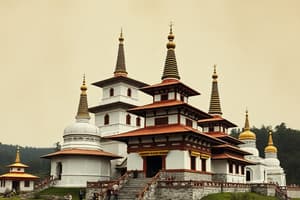Podcast
Questions and Answers
Match the following aspects of the Second Druk Gyalpo's reign with their corresponding descriptions:
Match the following aspects of the Second Druk Gyalpo's reign with their corresponding descriptions:
Reign = Consolidated the newly formed kingdom of Bhutan and established a strong and stable government Achievements = Played a crucial role in shaping Bhutan's early history and development Domestic Reforms = Introduced the concept of 'dual system of government' where the monarch and the je khenpo shared administrative powers Foreign Policy = Maintained good relations with neighboring countries, particularly Tibet
Match the following policies with their corresponding descriptions:
Match the following policies with their corresponding descriptions:
Domestic Reforms = Established a system of taxation and administration Foreign Policy = Successfully defended Bhutan against Tibetan invasions Social Reforms = Encouraged education and learning, particularly in Buddhist scriptures Achievements = Fostered a sense of national identity and unity among the Bhutanese people
Match the following aspects of the Second Druk Gyalpo's reign with their corresponding descriptions:
Match the following aspects of the Second Druk Gyalpo's reign with their corresponding descriptions:
Reign = Reigned from 1592 to 1616, succeeding his father Ngawang Namgyal Achievements = Promoted Buddhism and encouraged the establishment of monasteries and temples Domestic Reforms = Created a code of laws and regulations for the kingdom Succession = Ensured a smooth transition of power, maintaining stability in the kingdom
Match the following policies with their corresponding descriptions:
Match the following policies with their corresponding descriptions:
Match the following aspects of the Second Druk Gyalpo's reign with their corresponding descriptions:
Match the following aspects of the Second Druk Gyalpo's reign with their corresponding descriptions:
Match the following policies with their corresponding descriptions:
Match the following policies with their corresponding descriptions:
Match the following aspects of the Second Druk Gyalpo's reign with their corresponding descriptions:
Match the following aspects of the Second Druk Gyalpo's reign with their corresponding descriptions:
Match the following policies with their corresponding descriptions:
Match the following policies with their corresponding descriptions:
Match the following aspects of the Second Druk Gyalpo's reign with their corresponding descriptions:
Match the following aspects of the Second Druk Gyalpo's reign with their corresponding descriptions:
Flashcards are hidden until you start studying
Study Notes
Second Druk Gyalpo of Bhutan
Reign
- Reigned from 1592 to 1616
- Second king of Bhutan, succeeding his father Ngawang Namgyal
- Played a crucial role in shaping Bhutan's early history and development
Achievements
- Consolidated the newly formed kingdom of Bhutan
- Established a strong and stable government
- Promoted Buddhism and encouraged the establishment of monasteries and temples
- Fosteringed a sense of national identity and unity among the Bhutanese people
Domestic Reforms
- Introduced the concept of "dual system of government" where the monarch and the je khenpo (chief abbot) shared administrative powers
- Established a system of taxation and administration
- Created a code of laws and regulations for the kingdom
- Encouraged agriculture, trade, and commerce
Foreign Policy
- Maintained good relations with neighboring countries, particularly Tibet
- Successfully defended Bhutan against Tibetan invasions
- Established trade relations with neighboring countries, including India
Succession
- Died in 1616, and was succeeded by his son, Ngawang Namgyal
- Ensured a smooth transition of power, maintaining stability in the kingdom
Social Reforms
- Encouraged education and learning, particularly in Buddhist scriptures
- Promoted the development of arts and crafts, including weaving, painting, and sculpture
- Fostered a sense of social equality and justice, reducing social and economic disparities
Reign of the Second Druk Gyalpo
- Reigned from 1592 to 1616 as the second king of Bhutan, succeeding his father Ngawang Namgyal
- Played a crucial role in shaping Bhutan's early history and development
Consolidation and Development
- Consolidated the newly formed kingdom of Bhutan
- Established a strong and stable government
- Promoted Buddhism and encouraged the establishment of monasteries and temples
Government Reforms
Dual System of Government
- Introduced the concept of "dual system of government" where the monarch and the je khenpo (chief abbot) shared administrative powers
Administration and Taxation
- Established a system of taxation and administration
- Created a code of laws and regulations for the kingdom
Economy and Trade
- Encouraged agriculture, trade, and commerce
Foreign Policy
- Maintained good relations with neighboring countries, particularly Tibet
- Successfully defended Bhutan against Tibetan invasions
- Established trade relations with neighboring countries, including India
Succession and Legacy
- Died in 1616, and was succeeded by his son, Ngawang Namgyal
- Ensured a smooth transition of power, maintaining stability in the kingdom
Social and Cultural Reforms
- Encouraged education and learning, particularly in Buddhist scriptures
- Promoted the development of arts and crafts, including weaving, painting, and sculpture
- Fostered a sense of social equality and justice, reducing social and economic disparities
Studying That Suits You
Use AI to generate personalized quizzes and flashcards to suit your learning preferences.




